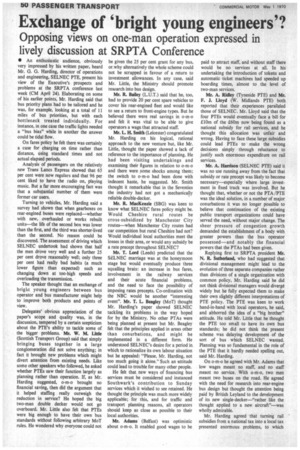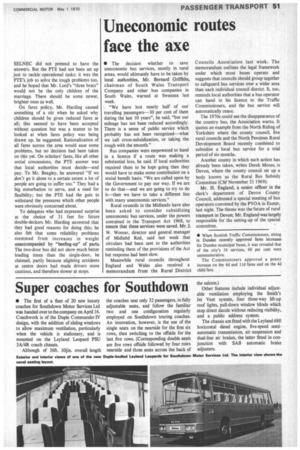Exchange of 'bright young engineers'?
Page 52

Page 53

If you've noticed an error in this article please click here to report it so we can fix it.
Opposing views on one-man operation expressed lively discussion at SRPTA Conference
• An enthusiastic audience, obviously very impressed by his written paper. heard Mr. G. G. Harding, director of operations and engineering, SELNEC PTE, present his view of the Executive's prospects and problems at the SRPTA conference last week (CM April 24). Elaborating on some of his earlier points, Mr. Harding said that bus priority plans had to be tailored and he was, for example, looking at a total of 11 miles of bus priorities, but with each bottleneck treated individually. For instance, in one case the traffic lights needed a "bus bias" while in another the answer could be tidal flow.
On fares policy he felt there was certainly a case for charging on time rather than distance, using standard times and not actual elapsed periods.
Analysis of passengers on the relatively new Trans Lanes Express showed that 65 per cent were now regulars and that 96 per cent liked to have the radio on, playing music. But a far more encouraging fact was that a substantial number of them were former car users.
Turning to vehicles. Mr. Harding said a survey had shown that when gearboxes on rear-engined buses were replaced—whether with new, overhauled or works rebuilt units—the life of the second box was lower than the first, and the third was shorter-lived than the second. No reason could be discovered. The assessment of driving which SELNEC undertook had shown that half the men drove very well and a further 25 per cent drove reasonably well; only three per cent had really bad habits (a much lower figure than expected) such as changing down at too-high speeds and overloading the transmission.
The speaker thought that an exchange of bright young engineers between bus operator and bus manufacturer might help to improve both products and points of view.
Delegates' obvious appreciation of the paper's scope and quality was, in the discussion, tempered by a certain scepticism about the PTE's ability to tackle some of the bigger problems. Mr. W. M. Little (Scottish Transport Group) said that simply bringing buses together in a large conglomeration did not solve anything; in fact it brought new problems which might divert attention from existing needs. Like some other speakers who followed, he asked whether PTEs saw their function largely as planning rather than operation. If, as Mr. Harding suggested, o-m-o brought no financial saving, then did the argument that it helped staffing really outweigh the reduction in service? He hoped the big two-man double decker would not go overboard. Mr. Little also felt that PTEs were big enough to have their own bus standards without following arbitrary MoT rules. He wondered why everyone could not be given the 25 per cent grant for any bus, or why alternatively the whole scheme could not be scrapped in favour of a return to investment allowances. In any case, said Mr. Little, the Ministry should promote research into bus design.
Mr. R. Bailey (L.U.T.) said that he, too, had to provide 20 per cent spare vehicles to cover his rear-engined fleet and would like to see a return to front-engine types. But he believed there were real savings in o-m-o and felt it was vital to be able to give operators a wage that attracted staff Mr. L. H. Smith (Leicester) congratulated Mr. Harding on his logical, rational approach to the new venture but, like Mr. Little, thought the paper showed a lack of reference to the importance of planning. He had been visiting undertakings and examining their figures in relation to o-m-o and there were some shocks among them: the switch to o-m-o had been done with indecent haste, he suggested. Mr. Smith thought it remarkable that in the Seventies the industry had not got a mechanically reliable double-decker.
Mr. R. MacKenzie (SBG) was keen to know what SELNEC fares policy might be. Would Cheshire rural routes be cross-subsidized by Manchester City routes—when Manchester City routes had car competition but rural Cheshire had not? Would individual local authorities meet the losses in their area, or would any subsidy be a rate precept throughout SELNEC?
Mr. T. Lord (Leeds) predicted that the SELNEC marriage was at the honeymoon stage but would eventually produce three squalling brats: an increase in bus fares, involvement in the railway services and their acute financial problems, and the need to face the possibility of imposing rates precepts. Co-ordination with the NBC would be another "interesting event". Mr. T. L. Beagley (MoT) thought Mr. Harding's paper showed SELNEC tackling its problems in the way hoped for by the Ministry. No other PTAs were being planned at present but Mr. Beagley felt that the principles applied in areas other than conurbations, and might be implemented in a different form. He understood SELNEC's desire for a period in which to rationalize its own labour situation but he appealed: "Please, Mr. Harding, not too much going it alone." Such an attitude could lead to trouble for many other people.
He felt that new ways of financing bus services must be considered and instanced Southwark's contribution to Sunday services which it wished to see retained. He thought the principle was much more widely applicable; for this, and for traffic and transport planning reasons, all operators should keep as close as possible to their local authorities.
Mr. Adams (Belfast) was optimistic about o-m-o. It enabled good wages to be paid to attract staff, and without staff there would be no services at all. In his undertaking the introduction of tokens and automatic ticket machines had speeded up boarding times, almost to the level of two-man services.
Mr. A. Ridley (Tyneside PTE) and Mr. F. J. Lloyd (W. Midlands PTE) both reported that their experiences paralleled those of SELNEC. Mr. Lloyd said that the four PTEs would eventually face a bill for £10m of the £60m now being found as a national subsidy for rail services, and he thought this allocation was unfair and wrong. Having to face these large subsidies could lead PTEs to make the wrong decisions simply through reluctance to justify such enormous expenditure on rail services.
Mr. A. Harrison (SELNEC PTE) said it was no use running away from the fact that subsidy or rate precept was likely to become necessary—especially where large investment in fixed track was involved. But he thought that, whether or not the PTA /PTE was the ideal solution, in a number of major conurbations it was no longer possible to believe that continuation of the existing public transport organizations could have served the need, without major change. The sheer pressure of congestion growth demanded the establishment of a body with greater powers than the bus operator possessed---and notably the financial powers that the PTAs had been given.
Replying first to SRPTA president Mr. N. R. Sutherland, who had suggested that divisional management might lead to the evolution of three separate companies rather than divisions of a single organization with common policy, Mr. Harding said he did not think divisional managers would diverge widely but he fully expected them to make their own slightly different interpretations of PTE policy. The PTE was keen to work hand-in-hand with local operators, he said, and abhorred the idea of a "big brother" attitude. He told Mr. Little that he thought the PTE too small to have its own bus standards: he did not think the present scheme was delaying development of the sort of bus which SELNEC wanted. Planning was so fundamental in the role of the PTE that it hardly needed spelling out, said Mr. Harding.
On o-m-o he agreed with Mr. Adams that low wages meant no staff, and no staff .meant no service. With o-m-o, two men meant two buses on the road. He agreed with the need for research into rear-engine bus design but thought the attention being paid by British Leyland to the development of its new single-decker—"rather like the thought applied to a new aircraft"—was wholly admirable.
Mr. Harding agreed that turning rail subsidies from a national tax into a local tax presented enormous problems, to which
SELNEC did not pretend to have the answers. But the PTE had not been set up just to tackle operational tasks; it was the PTE's job to solve the tough problems too, and he hoped that Mr. Lord's "three brats" would not be the only children of the marriage. There should be some newer, brighter ones as well.
On fares policy, Mr. Harding caused something of a stir when he asked why children should be given reduced fares at all; this seemed to have been accepted without question but was a matter to be looked at when fares policy was being drawn up, he suggested. Rationalization of all fares across the area would ease some problems, but no decision had been taken on this yet. On scholars' fares, like all other social concessions, the PTE answer was that local authorities must decide—and pay. To Mr. Beagley, he answered "If we don't go it alone to.a certain extent a lot of people are going to suffer too." They had a big conurbation to serve, and a need for flexibility; but the PTE had the guts to withstand the pressures which other people were obviously concerned about.
To delegates who had expressed surprise at the choice of 31 feet for future double-deckers Mr. Harding answered that they had good reasons for doing this; he also felt that some reliability problems stemmed from increases in weight unaccompanied by "beefing-up" of parts. The two-door bus did not show much better loading times than the single-door, he claimed, partly because alighting accidents at centre doors had made drivers more cautious, and therefore slower at stops.
















































































































































































































